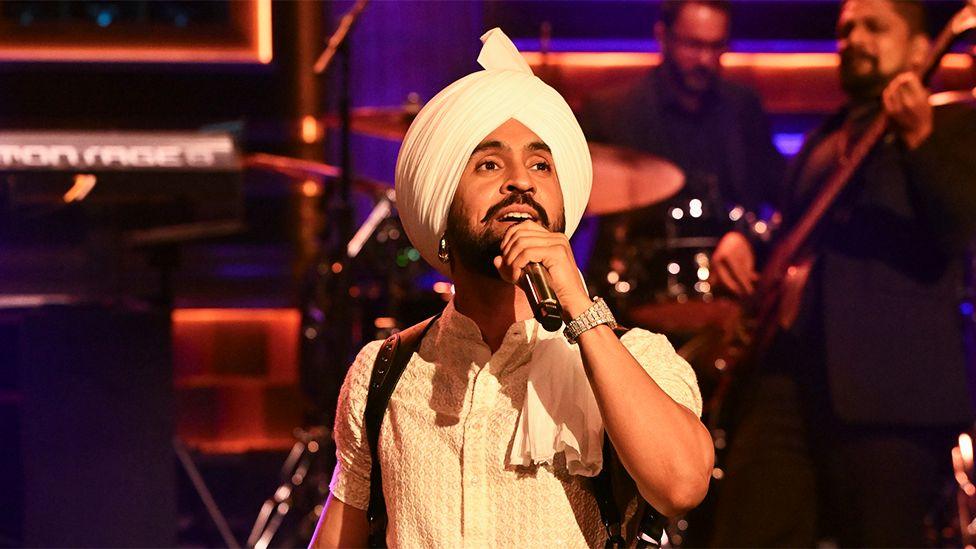From Coachella to Fallon: Decoding Diljit Dosanjh's stardom
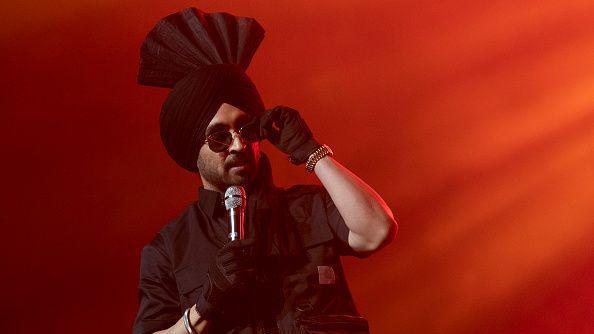
There is no bigger name in Punjabi music than Diljit Dosanjh
- Published
Who is Diljit Dosanjh?
The answer to that question would depend on who you ask.
To the uninitiated, Dosanjh is an incredibly popular Punjabi singer who last week made his debut on Jimmy Fallon’s The Tonight Show. The 40-year-old proudly sits atop what is known as the "Punjabi wave", a new generation of artists melding homegrown Punjabi music with rap and hip-hop.
Introduced by Fallon as "the biggest Punjabi artist on the planet", Dosanjh - dressed in traditional attire - performed his hits Born to Shine and G.O.A.T in front of a packed audience.
"Few seconds into it and everyone was dancing," says Sucharita Tyagi, a film critic who was present at the show. "You should have seen the faces of the house band - they were mind-blown."
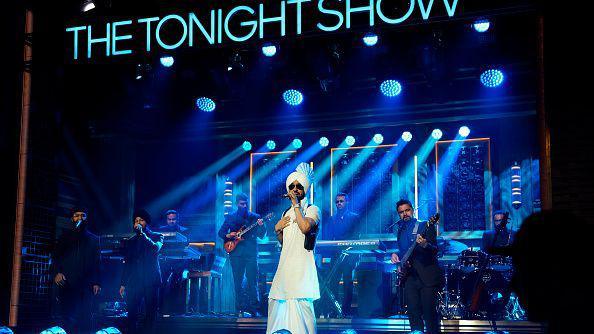
Dosanjh performed two of his hit tracks at The Tonight Show
Back in India, Dosanjh is also recognised as versatile actor who sings in all his films, as well as an accomplished producer. And to others who may never have seen his films or followed his music, he is a social media star who routinely creates a stir with funny videos on Instagram - a video of him having a hilariously frustrating conversation in Punjabi with voice assistant Alexa, external is a particular favourite for many.
Dosanjh is particularly interesting because his image is the antithesis of the Punjabi hip-hop stereotype, a musician who eschews the music's gritty sound and vocabulary for something more organic and traditional.
He is a soulful singer, his rich baritone soaring and quivering with emotion at the right places. At shows, he brings the house down with his energy (and gets Ed Sheeran to sing in Punjabi). And his performances on screen can move people to tears or laughter.
For his fans, he is foremost a "beeba munda", or a "good boy", whose spontaneity, natural charm and relatable persona make him one of the most endearing stars of his time.
"Ask three people in a room why they like the man and they'll give different reasons: his acting, singing or just the Instagram content he makes," Tyagi says. "But they'll all have one thing in common, which is their love for the person he is."
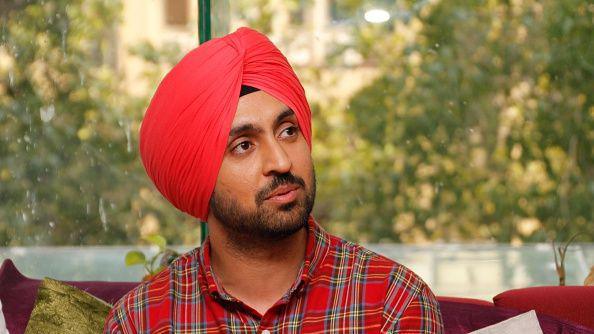
Dosanjh's humble beginnings as a small village boy are a big part of his story
Born as Diljit Singh in the Dosanjh Kalan village in Punjab, Dosanjh started his career by singing devotional songs at a local gurdwara. Those who knew him at the time say, external he was a "bashful boy" who "barely had any beard, but had the rhythm, did bhangra well, and tied a very good turban".
"He was a very god-fearing beeba boy, who was hungry to learn," Rajinder Singh, a song producer who gave Dosanjh his first break, once told The Indian Express, external.
At 16, he released his first album. The songs were less of a sensation at night clubs than at wedding parties, where his wide-eyed innocence and soulful voice instantly made him popular. Soon, he was getting shows almost every day.
A few years later, his parents sent him to the city of Ludhiana to live and train with his uncle, a local musician. It was a fertile time for pop music with regional artistes like Daler Mehndi and Panjabi MC of "Mundian to bach ke" fame taking Punjabi sounds to the world. In 2006, Dosanjh did his first international tour in Canada and a year later, he released his second album, this time under his new name: Diljit Dosanjh.
One thing led to another and by 2010, Dosanjh had also established himself as a popular actor in Punjab's vibrant film industry. Six years later, he made his Bollywood debut. Now, he's a global star.
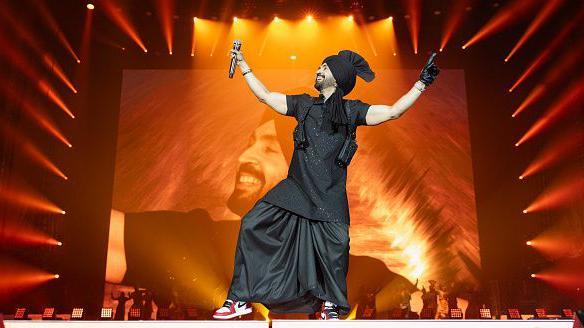
He routinely packs stadiums with his concerts around the world
Last year, he made history by becoming the first Punjabi language singer to perform at the Coachella festival. He also collaborated with pop singer Sia, and joined Sheeran while he was touring in India.
In his interviews, Dosanjh has repeatedly said that his success was not by coincidence - that he worked day and night to get here, diligently practising singing even when he was not getting opportunities.
But the modesty with which he carries himself makes him seem like a innocent bystander in his own path to fame.
"When a star grows to a certain stature, they usually want to reinvent themselves. But Dosanjh does not give in to personal excesses even as his popularity continues to soar," says communication consultant Dilip Cherian.
"By staying this modest good boy, he presses a whole bunch of right buttons with the audience," he adds.
Yet, Cherian believes there is more than meets the eye - and that some of Dosanjh's authentic persona could perhaps be performative.
In fact, Dosanjh himself has said, external that contrary to his image as a "pure soul" who does not care about the hustle, he's constantly trying to overtake competition: "This is my job and I don't make bones about it."
Dosanjh has consciously avoided falling into the trap of being "an edgy bad boy" - the conventional path followed by most of his peers, Cherian says.
Apart from an early phase in his career where his songs featured guns and spoke about male pride, Dosanjh has mostly stayed clear of controversial subjects - ditching the usual tropes of revenge and violence in Punjabi pop for themes like faith, love and tradition. Some of his most popular tracks like G.O.A.T and Born to Shine talk about how he's not here for the money but to make a name for himself and his village.
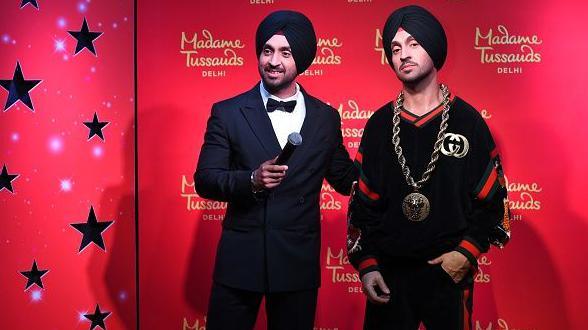
Fans say Dosanjh's honesty make him utterly relateable
He starts every concert with the declaration, "Panjabi aagaye hai (Punjab has arrived)", sings only in his mother tongue and claims he could not care less about speaking English well. "When you come from a really small place like mine, you want the world to know about it," he once said in an interview.
Though Dosanjh is aware of his roots - with each song trying to represent some aspect of his Punjabi identity - he is also not constrained by it. He draws heavily on tradition but also experiments with it, blending pop with blustering bhangra beats into songs that make hackneyed old tropes sound fresh and relevant.
When it comes to acting, he straddles comedy and serious roles, doing films on insurgency and the drug problem in Punjab such as Udta Punjab, along with light-hearted satires and love stories like Jatt & Juliet.
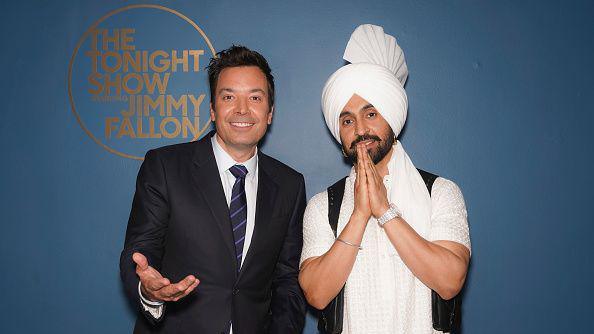
Dosanjh made a successful appearance on Jimmy Fallon's The Tonight Show recently
Those like Tyagi who've met him describe him as a "shy and quiet but extremely observant man". But that does not stop him from indulging in social-media stunts and cracking jokes, a lot of them at his own expense.
"After spending years in the industry, Dosanjh has got his people in place who help him manage this image - which is just about staying authentic but also carefully straddling the domestic and international audiences with his choices," Cherian says.
Whatever the verdict on his authenticity, what's undeniable is that Dosanjh is a man of singular talents.
Even Dosanjh's self-deprecating humour feels purposeful sometimes. He races to joke about himself - including about not being fluent in English - before someone else can. But beneath the lightness is a serious performer who is constantly thinking of his place in the world and of the ways he, a small village boy from Punjab, can challenge that with his art.
His music might be the bedrock of his career. Yet, Dosanjh offers much more: he's a whole package, a mix of old and new, simple and stylish all which make him utterly relatable.
"And even if some of the authenticity is manufactured, who is it hurting? He's not lying about his achievements or talents," Tyagi says.
"There are more frontiers to cover - and Dosanjh just wants to do everything."
Read more on this story
- Published5 October 2023
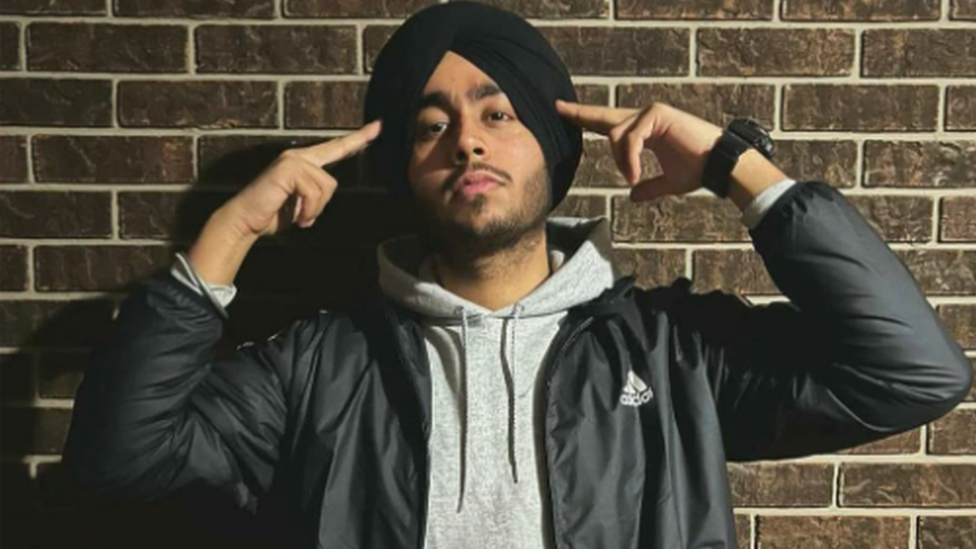
- Published31 May 2022
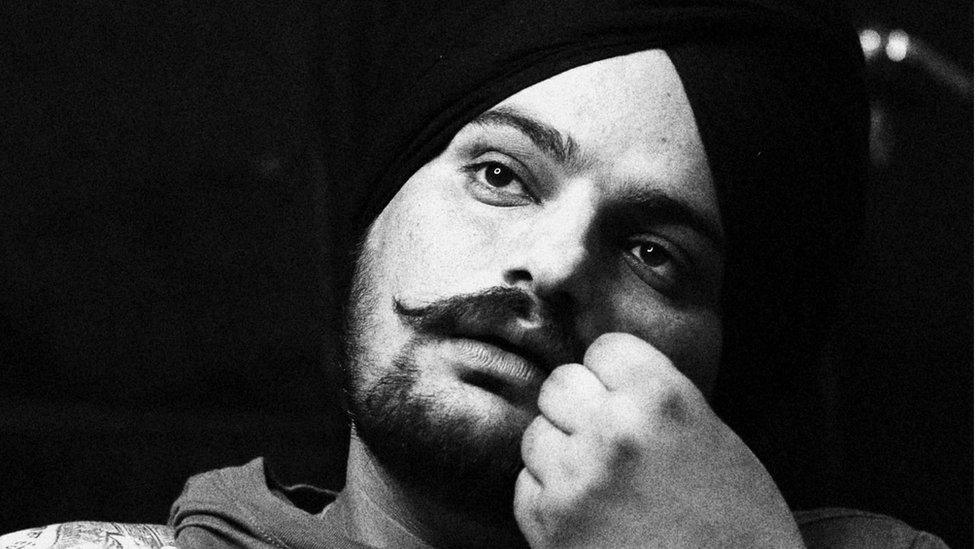
- Published18 June 2024
